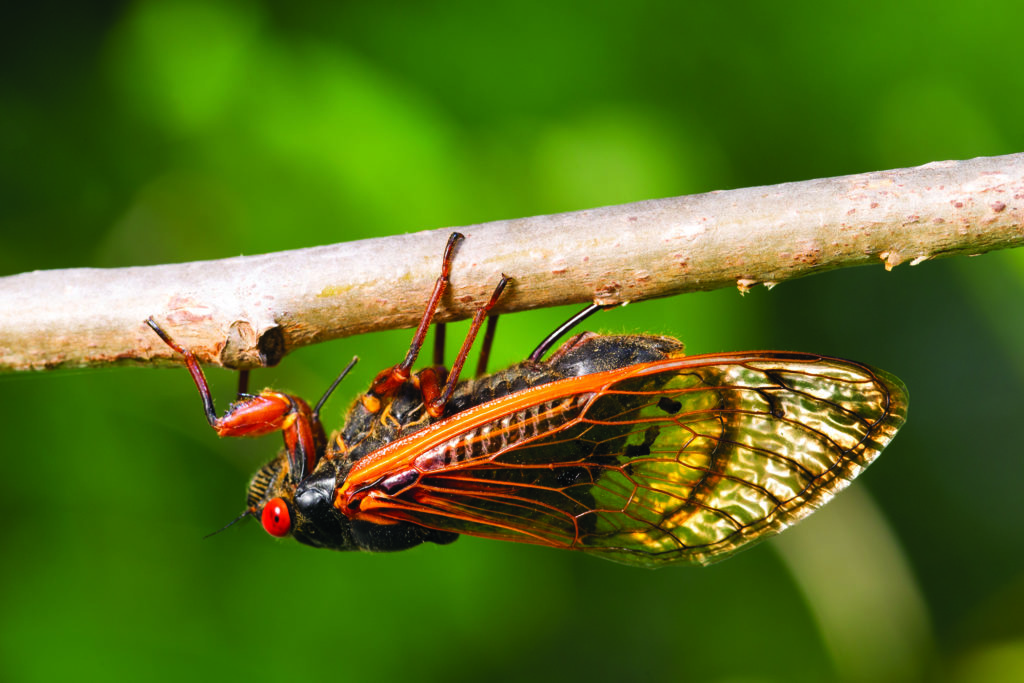
Summertime can be quite a noisy season, what with roaring lawnmowers, squealing children and pop-bang-booming fireworks, but if you’ve ever spent a summer in Alabama, you know these sounds pale in comparison to the racket raised by nature’s chorus of summer love songs.
Those songs may be performed by a variety of creatures, including birds and frogs, but the loudest performers are almost always insects that use their unique and often voluble voices to attract mates. In the process, their loud, sometimes disconcerting performances attract our attention, especially this year when the loudest of the crew, the cicadas, have received so much press.
In case you missed the media buzz, groups (broods) of periodical cicadas emerged this year in parts of the eastern U.S. after 17 years underground to hold synchronized and uproarious courtship concerts. To be clear, the 17-year cicadas didn’t play a gig here in Alabama, where we only have 13-year cicada broods that won’t put on their shows until 2024. But our annual cicadas — sharing the stage with katydids, crickets and grasshoppers — are currently holding outdoor performances across the state.
According to University of Alabama entomologist John Abbott, the 20 or so species of annual cicadas native to Alabama are pretty amazing creatures themselves. Like their more famous periodical relatives, annual cicadas spend most of their lives (2 to 5 years depending on the species) underground before they emerge for brief and furious periods of courtship and mating. But unlike their periodical kin, annual cicadas don’t synchronize their appearances during a single year. Instead, different populations of various “annual” cicada species emerge every year, which means we get annual concerts performed by the male cicadas trying to impress (attract) females.
Though cicadas may emerge anytime from May through September and even into October, they are at their most active during the hottest days of summer (usually July and August) thus earning them the nickname of “dog-day” cicadas. And, of course, they are not alone in their use of music to attract mates. Katydids, crickets and grasshoppers also perform summer love songs for their female audiences.
But lucky us, we get free admission to their concerts, which feature a variety of musical styles and techniques unique to each species. According to Abbott, katydids, crickets and grasshoppers use stridulation, the process of rubbing their wings and/or legs together to make their music. Cicadas, on the other hand, flex their tymbals, accordion-like membranes located in their abdomens, to create their signature sounds.
Together, these various insects join together for a festival of sound that goes on day and night through the summer, one that may admittedly be a bit much for the unaccustomed ear. But developing an ear for their music can also provide hours of summer entertainment, or at least a chance to develop a deeper appreciation of new musical genres.
Like birds, each of these insect species has a distinctive sound that we can use to identify them by ear. Crickets, for example, usually call at night using melodious trills and chirps. They are joined after dark by the nighttime buzzing, rattling and rasping tunes of katydids. Grasshoppers sound much like katydids, but they sing during the day, joining their sounds with the shriller, louder and more sustained voices of cicadas, which typically call during the day and at dusk.
Yes, those sounds can be obnoxious and even a bit creepy to some, but there’s nothing to fear as none of these insects pose a threat to us humans, other animals or to our plants and crops. In fact, they are important to our ecosystems, providing sustenance for birds and other wildlife and helping aerate and fertilize soils.
Abbott suggests checking out the songsofinsects.com website or other wildlife and entomologic organizations to learn more about these summer musicians. You can also become a citizen science effort, ideal for adults and children alike, by submitting observations about the flora and fauna in your yard and garden to iNaturalist (inaturalist.org) and other nature-focused databases.
Most important of all is to listen to the insects, birds and frogs performing this summer’s concert season. “It’s part of our natural history and a part of nature we should enjoy,” Abbott says.
Katie Jackson is a freelance writer and editor based in Opelika, Alabama. Contact her at katielamarjackson@gmail.com.





